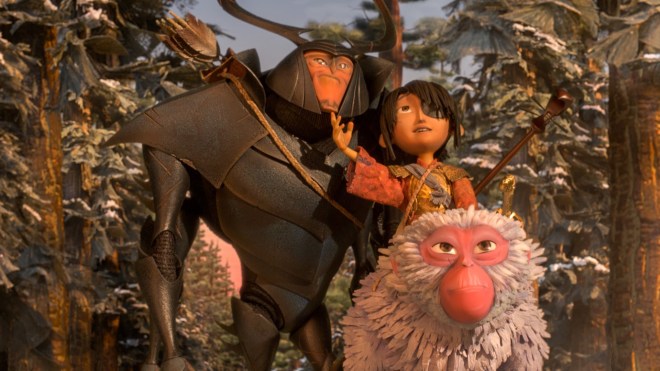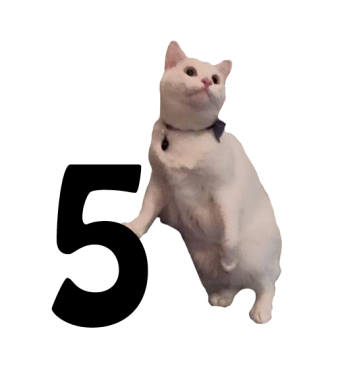by Michael B. Hock
There’s an easy way to start this review of Kubo and the Two Strings. I could easily say, “If you’re going to blink, do it now” – a line that has amazing significance in the movie. I don’t know if that’s something a good storyteller would do, stealing a line so blatantly. But then, I don’t know if I’m a good storyteller.
So… If you’re going to blink, do it now.
Kubo and the Two strings tells the story of a young boy named Kubo. He lives a life of hiding as he is constantly being hunted by his grandfather, but still finds time to tell stories using his magic to control bits of origami that seem to come to life. His mother warns him to never remove his father’s cloak, nor is he to not carry around a monkey figure, and lastly, he is to never let the night sky see him, for that would bring the wrath of his grandfather, the Moon King. Kubo is also tasked with taking care of his mother, who has started to lose her memory.
Naturally, Kubo being, well… a kid, he does stay out past dark, and learns that his mother is not telling stories, but he actually is the grandson of the Moon King, and he is being hunted by something that can see him. One magic beetle-wing ride and burned village later, and with the help of a monkey and a Beetle Warrior, he sets off on an epic quest to find the three pieces of armor that can help fight the moon king.
Ah, epic quests. Is there any other kind?
I could write books analyzing Kubo and the Two Strings, digging deep into it’s vastly rich storyline and culture, the symbolism, or the amazing animation. However, I don’t know that I have that kind of space here, so I’ll try to keep it kind of simple with this one line: This is an amazing movie.
At it’s core, Kubo is a quest movie where a young boy, in order to realize his destiny has to blah, blah, blah find magical things to stop the bigger magical thing. He’s Luke Skywalker, Harry Potter… you know that part of the story. Will he find the three magical artifacts? Since it’s not an established franchise with a hardcore base that studios can stretch out to dig in that sweet, sweet “part 2” money, you bet your sweet bippy that yes, Kubo finds the magical artifacts, along with comic relief in the form of Matthew McConaughey, and life lessons from Charlize Theron in monkey form.
What sets this apart is the way the story is told. I don’t mean just within stop motion animation. I mean the way it focuses on Kubo’s larger search for not only his family, but to notice the world around him in a unique way, and how does memory work with storytelling?
Kubo is a storyteller. Every day, he tells his stories, mostly involving Hanzo, his father, fighting off the Moon King, and every day, he doesn’t leave with any type of ending. The movie itself keeps going back to that idea of storytelling: it’s Kubo’s origami representation of Hanzo that points the way to the magical artifacts he needs to find. Kubo’s mother, who is in the midst of memory loss, comes alive when she starts telling stories as well, eventually shutting down when she realizes her memory itself is going. The idea of stories and memories is also reflected in that of Beetle, who can’t remember anything about his past, only vague stories about his role in fighting alongside Kubo’s father.
The intersection of memory and storytelling, too, is a very important one. What are we but our stories we tell? Beetle points this out when he mentions to Kubo that he will remembered in stories. The idea that a character that can’t remember his own past – but remembers Hanzo – is a telling him that he will be remembered is a very powerful one. But it’s also a reminder to look around and observe the stories that are around us. This brings us back to Kubo’s “don’t blink” comment earlier. Part of the narrative involves the Moon King wanting to blind Kubo, so he can start to observe the world the way he does – cold and calculating, unwilling to look at the world around them and see the warmth and the family.
Oh look… spoilers ahead. If you haven’t seen the movie or you don’t want to know, maybe you stop reading here. Or keep reading. I’m a sentence, not a cop.
Kubo himself is blind for most of the narrative as well, building those memories of his quest with Monkey and Beetle, unaware that they are reincarnations or magical representations or… something, it doesn’t really matter.. of his parents. He gets those memories while observing the warmth of his parents. It’s a reminder that even while blind, Kubo will get the answers he seeks.
Spoilers are over. Start reading again here.
I could keep going about how this wonderful film continues to invoke the idea of storytelling along with the love of family. But this is a movie that needs to be experienced. I highly recommend it. This is a beautifully constructed movie that does not waste time nor does it pull punches.


Interested to know what you thought of the animation? It’s so hard to make claymation move as naturally as it does in Kubo (for most of the movie, I think it kind of peters out in the end) and I feel that that ought to win it an Oscar by itself.
LikeLike